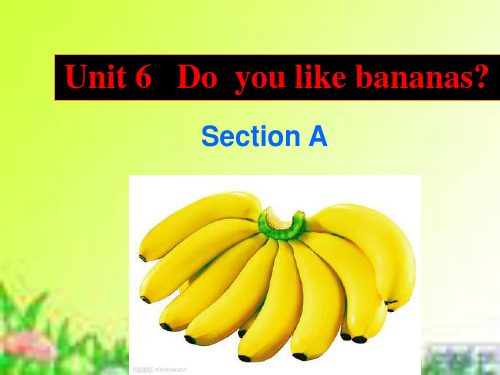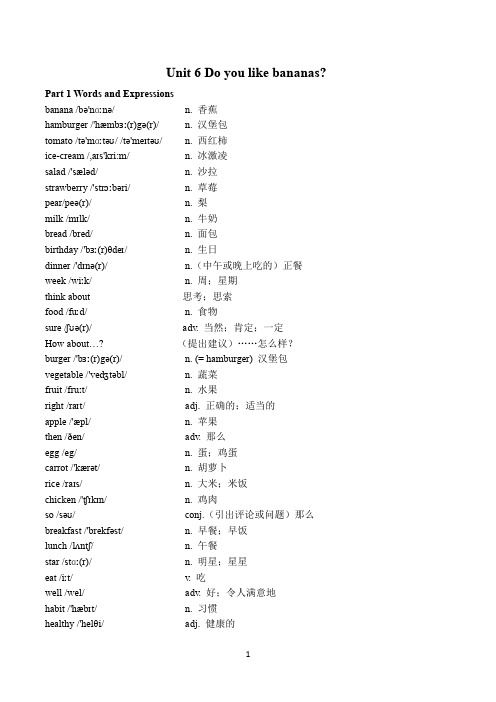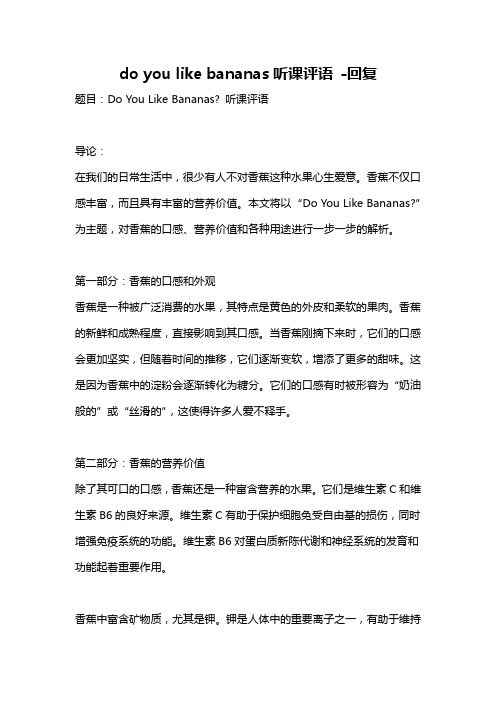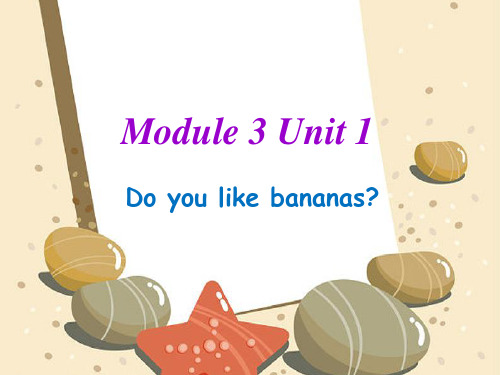do you like banana
新目标英语七年级上册Unit6_Do_you_like_bananas课标解析

新目标英语七年级上册Unit6 Do you like bananas?课标解析
许晏菱初2014级
教材分析
本单元的主题是教会学生在日常生活中养成健康饮食的习惯。
整个单元以食物名词为主题,以一般现在时的like进行对话为途径,从听说读写等方面开展学习任务。
语法的重点是行为动词的一般现在时。
由于课文以对话展现,学生很容易地把生活中的情景和书上的对话以及文段比较自然地联合起来。
本单元的中心话题是Food,主要语言功能项目是Talk about likes and dislikes.当主语是第三人称单数时句型的变化以及回答是本单元的语法重点。
在第五单元学生已经对do and does 有了一定的认识。
本单元主要句型:Do you like…? 及其回答Yes, I do. / No, I don’t.学生就容易理解。
综上所述,本单元以食物为主线,围绕着谈论喜欢与不喜欢以及一日三餐等语言功能项目展开了一系列任务活动。
要求学生能够用英语写一篇介绍自己家人喜欢和不喜欢的食物,养成健康饮食的习惯。
单元教学安排
本单元分为5个课时,分别是sectionA两课时,sectionB两课时,一课时阅读课。
单元目标
课时目标
思想情感目标:
1)通过学习文章,学会养成健康饮食的习惯。
2)学习养成节约粮食,爱惜食物的品质。
能力发展目标:
1)能掌握书面表达的基本写法。
2)能正确使用可数名词和不可数名词。
3)能掌握一般现在时的结构、意义和用法。
人教版七年级上册英语讲义 Unit 6 Do you like bananas

Unit 6 Do you like bananas? 讲义一、【重点单词】banana /bə'nɑ:nə/香蕉hamburger /'hæmbɜ:(r)ɡə(r)/汉堡包tomato /tə'mɑ:təʊ/西红柿ice-cream /,aɪs'kri:m/冰激凌salad /'sæləd/沙拉strawberry /'strɔ:berɪ/草莓pear /peə(r)/梨milk /mɪlk/牛奶bread /bred/面包birthday /'bɜ:(r)θdeɪ/生日dinner /'dɪnə(r)/(中午或晚上吃的)正餐week /wi:k/周;星期food /fu:d/食物sure /ʃʊə(r)/当然;肯定;一定burger /'bɜ:(r)ɡə(r)/汉堡包= hamburgervegetable /'veʤtəbəl/蔬菜fruit /fru:t/水果right /raɪt/正确的;适当的apple /'æpl/苹果then /ðen/那么egg /eɡ/蛋;鸡蛋carrot /'kærət/胡萝卜rice /raɪs/大米;米饭chicken /'ʧɪkɪn/ji鸡肉so /səʊ/ (引出评论或问题)那么breakfast /'brekfəst/早餐;早饭lunch /lʌnʧ/午餐star /stɑ:(r)/明星;星星eat /i:t/吃well /wel/好;令人满意的habit /'hæbɪt/习惯healthy /'helθi/健康的really /'ri:əli/真正地question /'kwesʧən/问题want /wɒnt/需要;想要be /bi:/变成fat /fæt/肥的;肥胖的二、【重点短语】1. John ’s birthday dinner 约翰的生日宴会2. vegetable salad 蔬菜沙拉3. two tomatoes 两个西红柿4. eat well 吃得营养5. think about 考虑6. eat/have breakfast/lunch/dinner 吃早/午/晚饭7. sports stars 体育明星8. the volleyball star 排球明星9. ask sb. about sth. 问某人某事10. like hamburgers/ice-cream 喜欢汉堡包/冰淇淋11. like eating eggs 喜欢吃鸡蛋12. her eating habits 她的饮食习惯13. be (not) healthy (不)健康14. one last question 最后一个问题15. healthy food 健康食物16. after breakfast/lunch/dinner 早/午/晚饭后17.one last question 最后一个问题18.some fruit 一些水果19.for dinner 作为晚餐20.how about 怎么样三、【重点句型】1.—Do you like salad? 你喜欢沙拉吗?一Yes,I do. /No, I don’t. 是的,我喜欢。
Do-you-like-bananas课件

salad
bananas
2b Listen again and fill in the blanks
tomatoes
ice cream ice cream
tomatoes
2c
• 用2b 中的句型编新对话,谈自 己的真实情况。
Pair work
A: I like bananas/ice cream…Do you like bananas/ice cream..?
• Does Tom like …? • Yes, he does./ No, he doesn’t. • Does Sally like …? • Yes, she does./ No, she doesn’t.
2a
Food Fruit
Yes Maybe No
Vegetables
Eggs
Chicken
1c
编新对话
Do you like…?
Yes, I do. / No, I don’t.
2a Listen and circle the food you hear. 听录音,圈出所听到的食物。
hamburgers pears tomatoes
strawberries oranges ice-cream
brackets .
3b • Number these sentences 1-4 to make a
conversation.
3-2-1-4
3c Food survey 1
Period 3
Do you like bananas? Yes,I do. I like bananas. Does he like bananas? Yes,he does. He like bananas. Do you like salad? Yes,I do. I like salad. Does she like salad? Yes,she does. She likes bananas
Do you like banana (你喜欢香蕉吗)

九、Do you like banana(一)单词banana香蕉hamburger汉堡包tomato西红柿ice-cream冰淇淋salad 沙拉strawberry草莓pear梨milk牛奶bread面包birthday生日dinner(中午或晚上吃的)正餐week周、星期think about思考、考虑food食物sure当然how about...? ......怎么样?vegetable蔬菜fruit水果right正常apple苹果then那么egg蛋、鸡蛋carrot胡萝卜rice 大米、米饭chicken鸡肉so那么breakfast早饭lunch午餐star星星、明星eat吃well好habit习惯healthy健康的really真的吗question问题want想要、需要be变成fat肥的、胖的(二)对话1、A:Do you like bananas?B:Yes,I do/No,I don’t.A:Do they like pears?B:Yes,they are/No,they don’t.A:Dose she like tomatoes?B:Yes,she dose/No,she dosen’t.A:I like oranges,I don’t like bananas.B:We like rice. We don’t like hamburgers.A:He likes ice-cream ,He doesn’t like vegetables.2、A:Hey,Jack’s birthday dinner is next week.Let’s think about the food.B:Sure.How about hamburgers,vegetable salad,and some fruit?A:Sound good.Jack likes hamburgers.B:Oh,I don’t like salad。
英语:Unit 6《Do you like bananas》教案和练习(人教版七年级上)

英语:Unit 6《Do you like bananas》教案和练习(人教版七年级上)一、学习目标:知识目标1. Do you /they like salad?Yes, I (we)/ they do.No, I (we)/ they don’t.2. I /We /They like oranges.I/ We /They don’t like oranges.能力目标Talk about likes and dislikes. 谈论好恶。
二、重点、难点:重点1. 单词:有关食品名称的单词2. 句型:like 在一般时态中的使用She /He likes bananas.She/ He doesn’t like bananas.—Does she /he like French fries?—Yes, she/ he does.—No, she/ he doesn’t.难点可数名词与不可数名词三、知能提升:(一)【重点词汇】[单词学习]1.(1)fruit水果:banana香蕉orange橙子梨strawberry草莓apple苹果(2)vegetable 蔬菜:tomato西红柿broccoli西兰花胡萝卜(3)food 食物:French fries炸薯条Hamburger汉堡包egg[eg]鸡蛋chicken鸡肉甜食(4)three meals 三餐:breakfast, lunch, dinner.【考题链接】A. applesB. breakfastC. carrotsD. hamburgersE. broccoliF. dinnerG. potatoes H. oranges I. saladJ. French fries(1) Tom likes fruit, so he likes __________ and __________.(2) A: What vegetables do you like?B: I like __________, __________ and __________.(3) I usually drink milk for __________ and __________.(4) A: Do you like fast food?B: Yes, I like __________, __________ and __________.答案:(1) A; H(2) C; E; G(3) B; F(4) D; I; J2. like [laik]v. 喜欢【用法1】like sb./ sth. 喜欢某人/某物,后接名词或代词。
人教版七年级上Unit6_Do_you_like_bananas)课件

1. Write down the conversation(2c) between your and your partner.
2. Write a report according to the survey.
Unit 6 Do you like bananas
Aims and Language points:
2. -Let’s think about the food.
-Sure.
-让我们想想(吃什么)食物吧。 -当然。/没问题
think about “对…有(某种观点); 回想起;考虑”
Eg. You can think about it. 你可以把这事考虑一下。
Sure.
What do you think about him? 你觉得他这人怎么样?
中用助动词does。 疑问句和否定句中用到does后,谓语动词用原形(like).
Let’s chant
Join us, join us. Let’s have a party. Do you like salad ? Yes, I do. Do you like bread ? No, I don’t. Does he like apples ? Yes, he does. Does she like pears? No, she doesn’t. Do they like hamburgers? Yes, they do. I see. I see. Let’s have a party.
Do you like …?
Names
tomatoes
ice-cream
hamburger s
2a.Listen and circle the food. (Students’ Book Page 32)
小学英语课件二年级上册-Module3.1 Do you like bananas_外研版(一起)

二年级上册
Module 3
Unit 1 Do you like bananas ?New wordsba Nhomakorabeaana 香蕉
apple 苹果
orange 柑橘,橙
New words
fruit
水果(不可数名词)
milkshake
奶昔(不可数名词)
milk
奶,牛奶(不可数名词)
Sentences
Yes , I do . 是的,我喜欢。
No , I don’t . 不,我不喜欢。
Practise
连线题 1. No , I don’t . 2. I don’t like bananas. 3. Do you like milk ? 4. I like fruit milkshake.
A.我喜欢牛奶奶昔。 B. 不,我不喜欢。 C.我不喜欢香蕉。 D.你喜欢牛奶吗?
I like fruit milkshake. 我喜欢水果奶昔。
I like bananas. 我喜欢香蕉。
like+可数名词用“复数”,表示这“一类” like+不可数名词用“单数”,也表示这“一类”
Sentences
I like bananas. 我喜欢香蕉。
I don’t like bananas. 我不喜欢香蕉。
like+可数名词用“复数”,表示这“一类”
Sentences
Do you like milk ? 你喜欢牛奶吗?
Do you like bananas ? 你喜欢香蕉吗?
like+不可数名词用“单数”,也表示这“一类”
Sentences
Do you like bananas ? 你喜欢香蕉吗?
高中英语unit6 Do you like bananas

Unit 6 Do you like bananas?你喜欢香蕉吗?☞【学习目标汇总:】【教材重点解析】:1.t omato 西红柿(教材第31页)tomato可数名词,复数为:tomato es.There are three tomatoes on the table.桌子上有三个西红柿。
______(西红柿)。
解析:tomato可数名词,复数为:tomato es.句意:我喜欢许多蔬菜,比如卷心菜、胡萝卜和西红柿。
答案:tomato es.2. Do you like bananas? 你喜欢香蕉吗。
(教材第31页)☆☆☆☆☆必考○1可数名词可用复数表示一类人或事物.○2询问某人的喜好,通常用一般疑问句:Do / Does +主语+ like + 其他?肯定回答:Yes , 主语+ do / does.否定回答:No,主语+ don’t / doesn’t.do/does 为助动词。
典例:1.He likes salad for supper. (变为一般疑问句) ______ he ______ salad for supper?(答案:Does like)典例:2. They like to eat ice-cream. (变为否定句) They _______ _______ to eat ice-cream.(答案:don’t like )典例:3.I like fruit, but I don’t like vegetables.(用Jane作主语改写句子)_____________________________________________________________.(答案:Jane likes fruit, but Jane doesn’t like vegeyables.)3)、土豆沙拉(potato salad)、海鲜沙拉(seafood salad)等。
典例:1让我们吃沙拉。
人教版英语七年级上册 Unit 6 Do you like bananas

This is a fruit and vegetable house (果疏屋). What’s in the house? (果蔬屋里有什么?)
some vegetables
some fruits
banana bananas
pear pears
strawberry strawberries
2 A: Do you like salad? B: No, I don’t.
1 A: Do you like bananas? B: Yes, I do.
3 A: Do you like oranges? B: Yes, I do.
Post-listening
1c Practice the conversations with your partner. Then make your own conversations.
2. tomatoes __i _ 3. oranges _f__ 4. ice-cream _h__ 5. salad __b_ 6. bananas _g__
7. strawberries __c_ 8. pears __j_
9. milk __e_ 10. bread _a__
Read the dialogue in the picture.
Read the conversation after the tape.
1. Girl: I like hamburgers. Do you like hamburgers? Boy: Yes, I do.
2. Girl: Do you like tomatoes? Boy: No, I don't like tomatoes.
—Do you like bananas? —Yes, I do. —Do you like salad? —No, I don’t. —Do you like oranges? —Yes, I do.
《Unit 6 Do you like banana?》说课稿

《Unit 6 Do you like banana? 》说课稿Section A 1 (1a-2d)一、教学目标:1. 语言知识目标:1) 能掌握下列词汇:banana, hamburger, tomato, ice-cream, salad, strawberry, pear, milk, bread, birthday, dinner, food, week, sure, How about …?, burger, vegetable, fruit, right, then2) 能掌握以下句型:①—Do you like salad? —Yes, I do. / No, I don’t.②—Does she/he like …? —Yes, she/he does./ No, she/he doesn’t.③—I like … /I don’t like …④—He/Sh e likes … / He/She doesn’t like …3) 能通过介绍食物学会询问对方喜欢与不喜欢的食物。
2. 情感态度价值观目标:该部分学习内容贴近学生的生活,谈论的主题涉及学生的饮食习惯和偏爱,对学生养成健康的饮食习惯很有帮助,能引起学生的特别关注,极易于激发学生学习英语的欲望和兴趣,使他们乐于参与各种英语实践活动。
通过学习西方食品文化,促使学生了解西方生活方式与文化,培养跨文化交际的意识。
二、教学重难点1. 教学重点:1) 学习并积累一些食物的词汇。
2) 名词复数的使用。
3)动词like一般现在时的各种句式及一般疑问句的肯定、否定回答;2. 教学难点:1) 行为动词like的一般现在时的用法;2) 使用do和does引导的一般疑问句的构成和使用。
三、教学过程I. New wordsAccording the pictures, learn the new words.II. Warming-upAsk some Ss questions:T: What’s that?S1: It’s _______.T: What are those?S1: They are _______.III. Presentation1. Show some pictures of food on the screen and learn the new words.(banana, hamburger, tomato, ice-cream, salad, strawberry, pear, milk, bread, birthday, food, burger, vegetable, fruit)2. Let Ss read and try to remember the new words.3. T: Let’s look at the picture in 1a. Match the words with the things in the picture. Thencheck the answers.IV. ListeningT: Let’s work on 1b. Listen and number the conversations [1-3].Ss listen to the tape and number the conversations.V. Pa ir work1. Read the conversations in 1b. Have Ss read after the teacher.2. Now let’s act out the conversations 1-3.(Ss work with their partner and act out the conversation 1-3.)3. Look at the picture and make more conversations using the words in 1a.4. Let some pairs act out their conversations.VI. Listening1. Point to and read each word aloud, Ss only listen. Then let some Ss read the words bythemselves. Check that Ss understand the meaning of the ea ch word.2. Play the recording for the first time, Ss only listen.3. The n play the recording again Ss circle the words they hear. Play the recording again.Check the answers.4. A girl and a boy want to have something in the restaurant. Do they like hamburgers? Doesthe boy like milk? Does the boy like ice-cream? Now let’s listen to the recording.For the first time, Ss only listen.For the second time, Ss listen and fill in the blanks.Play the recording for the third time, Check the answers.VII. Pair work1. Read the conversation in speech bubbles in 2b. Ask Ss to read after the teacher.2. Ss practice the conversations in pairs.3. Let some pairs act out the conversations.4. Ss give answers that are true for them. Then practice their conversations.5. Ask some pairs act out their conversations.VIII. Reading1.According the pictures, learn the new words.2.Read the dialogue in 2d. Then answer the questions.Does John like hamburgers?What does Jack don’t like?What fruit does John like?3. Read the dialogue with your partner. Then role play the conversation.4. Practice the conversation with your partner.5. 评价:(让学生们对自己的表现及语言表达能力进行自我评价,在小组内评价,然后进行评出最优秀的小组。
英语七年级上册Unit6Doyoulikebananas人教版七年级上unit6课件

I couldn’t think of the name of that man. 我想不出那人的名字来了。
Let’s think of some questions about life. 让我们对生活设想一些问题吧。
4. sure adv. (副词)当然;肯定;一定 常用来回答一般疑问句,意为“当然; 的确”,相当于yes或certainly。只是 sure 在英国英语中较为常用,而在美国 英语中常用certainly。
Jack: Hey, John’s birthday dinner is next week.
Let’s think about the food.
Tom: Sure. How about burgers, vegetable salad,
and some fruit?
2d
Bill: Sounds good. John likes hamburgers.
last week 上礼拜
this week 本周
next week 下周
3. think about 思考,思索
(一般是短时间的较仔细的考虑) What do you think about that? 你认为怎么样? I’ll have to think about it. 我得想一想。
think of 想到;想象;设想 多用来指“想起,认为”。
Countable nouns Uncount- Countable and
able uncountable
nouns nouns
hamburgers, e_g_g_s milk _o_r_a_n_g_e_s__a_p__p_le_s_ bread _b_a_n_a_n__a_s__p_e_a_r_s_ rice _ca_r_r_o_t_s__t_o_m_a__to_e_s _v_e_g_e_t_a_b_le_s______
人教版七年级英语上册教案(RJ) Unit 6 Do you like bananas

Unit 6Do you like bananas?第一课时Section A(1a-1c)1.重点单词:banana,hamburger,tomato,icecream,salad,strawberry,pear,milk,bread2.重点句式:—Do you like bananas?—Yes,I do.—Do you like salad?—No,I don't.1.用like来谈论喜好2.可数名词的单复数1.用like来谈论喜好2.可数名词的单复数一、预习课本P31新单词并背诵,完成下面的汉译英。
1.香蕉____________ 2.汉堡____________3.西红柿____________ 4.冰激凌__________5.沙拉____________ 6.草莓____________7.梨____________ 8.牛奶____________9.面包____________二、认真预习1a,1b,1c,找出下列句型。
1.—你喜欢香蕉吗?—是的,我喜欢。
________________________________________________________________________ 2.—你喜欢沙拉吗?—不,我不喜欢。
________________________________________________________________________Step 1情景导入Teacher:There are many different kinds of fruits and vegetables in the world,and different people like different food.Everyone has its own taste.What kind of food do you like?What kind of food do you dislike?Today let's talk about the food we like and we dislike in Unit 6.环节说明:由学生感兴趣的话题导入新课,简洁明了,激起学生的学习兴趣。
人教版七年级上册英语Unit6 Do you like bananas导学案(英语教案)

9.apple(n.)苹果10.then(adv.)那么
11.egg(n.)鸡蛋12.carrot(n.)胡萝卜
13.rice(n.)大米14.chicken(n.)鸡肉
15.so(conj.)那么
二、重点短语
1.think about思考;思索
29.well(adv.)好
30.habit(n.)习惯
31.healthy(adj.)健康的
32.really( adv.)真正地
33.question(n.)问题
34.want(v.)想要
35.be(v.)变成
36.fat(adj.)胖的
重要短语
1.like hamburgers喜欢汉堡
2.three bananas三根香蕉
4.先自己读对话,然后在小组内分角色表演对话。老师选三组同学分角色表演对话进行比赛。完成2d的任务。(5分钟)
环节说明:学生学习有关食物的词汇,通过分类了解名词的可数与不可数。通过听力基本了解询问对方好恶的句型。学生在结对练习中学会谈论好恶的方法,通过小结训练掌握Do you like…?句型。教学目标得以实现,
单元语法
1.Present tense to like
2.Countable nouns and uncountable nouns.
单元
重难点
重点:Present tense to like; Countable nouns and uncountable nouns.
难点:Present tense to like; Countable nouns and uncountable nouns.
Teacher:Hello, boys and girls. Do you know what kind of food I like? Let me tell you. I like rice and potatoes very much. I have them every day. I like vegetables, especially carrots and tomatoes. As for fruit,I like bananas and pears, but I don’t like oranges. I really don’t like hamburgers or French fries. I hardly have them. I have a healthy eating habit. How about you? Can you tell me your likes and dislikes? (2分钟)
2020七年级英语上册 Unit 6 Do you like bananas(单词+重点句型)语法解析

Unit 6 Do you like bananas?banana 香蕉hamburger 汉堡包tomato 西红柿ice-cream 冰激凌salad 沙拉strawberry 草莓pear 梨milk 牛奶bread 面包birthday 生日dinner (中午或晚上吃的)正餐week 周;星期think about 思考;思索food 食物不可数sure 当然;肯定;一定How about (提出建议)......怎么样?burger 汉堡包vegetable 蔬菜fruit 水果right 正确的;适当的apple 苹果then 那么egg 蛋;鸡蛋carrot 胡萝卜rice 大米;米饭chicken 鸡肉so (引出评论或问题)那么breakfast 早餐;早饭lunch 午餐star 明星;星星eat 吃well 好;令人满意地habit 习惯healthy 健康的really 真正地question 问题want 需要;想要be 变成fat 肥的;肥胖的1.breakfast n.早餐;早饭(表示一日三餐前的词一般不用冠词)【解析】①吃三餐习惯与动词have 连用,且为零冠词,但与形容词连用时,前面要加不定冠词a/an。
have breakfast 吃早饭have a good breakfast 吃一顿丰盛的早餐have a quick breakfast 早餐吃得很快②at breakfast 吃早餐时【扩展】brunch n.早午餐2. well adv.好;令人满意地【解析】常见搭配:do well in…在……做得好辨析good,fine,well,fine.① good 意为“好的,令人满意的”,常指物品的质量,人的品质等方面的好,也常与morning,evening,afternoon等词搭配表示问候。
Alice is a good girl. 爱丽丝是一个好女孩。
人教版-英语--上-6单元-Do-you-like-bananas-单元复习

Unit6 Do you like bananas?Section A喜欢后面加名词,也可以加动词的—ing 形式,有固定短语:like to do sth =like doing sth (喜欢做什么)其中,like to do 是表示:习惯做什么; like doing 是表示:爱好干什么。
例如:I like watching TV. 我喜欢看电视She likes to get up at six o’clock .她习惯在六点起床2. tomato n.西红柿其复数在后面加es,与tomato一样以o结尾的词,起复数有两种形式。
有生命的词加es。
如:tomato—tomatoes西红柿 potato—potatoes马铃薯,无生命的词加s如:radio—radios收音机 photo—photos图片。
3. orange. 橘子,橙子橘子汁;做“橘子,橙子”讲时,为可数名词,复数加s,例如:He has two oranges.做橘子汁讲,为不可数名词,例如:I want to drink some orange.4. salad n. 沙拉salad是不可数名词,故没有复数形式,也不能用不定冠词a或an 修饰。
如: Pass me the salad, please. 请递给我那份沙拉。
5. food n. 食品,食物(1)通常用作不可数名词,但指特定食品时为可数名词,如:She want to eat some food.她想吃点东西I like Chinese food very much.我很喜欢中式食品(2)常用作短语,food and drink饮食6. 辨析:talk about talk with talk to(1) talk about sth. 意思是:谈论某事。
如:They are talking about the traffic accident. 他们正在谈论那个交通事故。
Unit 6 Do you like bananas课文原文及语法重点

Unit 6 Do you like bananas? Part 1 Words and Expressionsbanana /bə'nɑːnə/ n. 香蕉hamburger /'hæmbɜː(r)gə(r)/ n.汉堡包tomato /tə'mɑːtəʊ/ /tə'meɪtəʊ/ n. 西红柿ice-cream /,aɪs'kri:m/ n.冰激凌salad /'sæləd/ n. 沙拉strawberry /'strɔːbəri/ n.草莓pear/peə(r)/ n. 梨milk /mɪlk/ n.牛奶bread /bred/ n. 面包birthday /'bɜː(r)θdeɪ/ n.生日dinner /'dɪnə(r)/ n.(中午或晚上吃的)正餐week /wiːk/ n.周;星期think about 思考;思索food /fuːd/ n.食物sure /ʃʊə(r)/ adv.当然;肯定;一定How about…? (提出建议)……怎么样?burger /'bɜː(r)gə(r)/ n. (= hamburger) 汉堡包vegetable /'vedʒtəbl/ n. 蔬菜fruit /fruːt/ n.水果right /raɪt/ adj.正确的;适当的apple /'æpl/ n.苹果then /ðen/ adv.那么egg /eg/ n.蛋;鸡蛋carrot /'kærət/ n.胡萝卜rice /raɪs/ n. 大米;米饭chicken /'tʃɪkɪn/ n. 鸡肉so /səʊ/ conj.(引出评论或问题)那么breakfast /'brekfəst/ n.早餐;早饭lunch /lʌntʃ/ n. 午餐star /stɑː(r)/ n.明星;星星eat /iːt/ v.吃well /wel/ adv. 好;令人满意地habit /'hæbɪt/ n.习惯healthy /'helθi/ adj. 健康的really /'riːəli/ adv. 真正地question /'kwestʃən/ n.问题want /wɒnt/ v. 需要;想要be /biː/ v.变成fat /fæt/ adj. 肥的;肥胖的Part 2:Texts课文(一)Jack: Hey, John’s birthday dinner is next week. Let’s think about the food. Tom: Sure. How about burgers, vegetable salad, and some fruit?Bill: Sounds good. John likes hamburgers.Jack: Oh, I don’t like salad.Bill:But John likes salad, and it’s his birthday.Jack:Yes, you’re right. What about the fruit?Tom: I think John likes strawberries and apples.Jack:OK. Let’s have strawberries and apples then.Structure——谈论好恶1.Do you like salad? Yes, I do./No, I don’t.2.Do they like pears? Yes, they do./ No, they don’t.3.Does she like tomatoes? Yes, she does./ No, she doesn’t.4.I like oranges. I don’t like bananas.5.We like rice. We don’t like hamburgers.6.He likes ice-cream. He doesn’t like vegetables.重点句型:Underline the correct words in the brackets.在括号内正确的单词下画线。
do you like bananas听课评语 -回复

do you like bananas听课评语-回复题目:Do You Like Bananas? 听课评语导论:在我们的日常生活中,很少有人不对香蕉这种水果心生爱意。
香蕉不仅口感丰富,而且具有丰富的营养价值。
本文将以“Do You Like Bananas?”为主题,对香蕉的口感、营养价值和各种用途进行一步一步的解析。
第一部分:香蕉的口感和外观香蕉是一种被广泛消费的水果,其特点是黄色的外皮和柔软的果肉。
香蕉的新鲜和成熟程度,直接影响到其口感。
当香蕉刚摘下来时,它们的口感会更加坚实,但随着时间的推移,它们逐渐变软,增添了更多的甜味。
这是因为香蕉中的淀粉会逐渐转化为糖分。
它们的口感有时被形容为“奶油般的”或“丝滑的”,这使得许多人爱不释手。
第二部分:香蕉的营养价值除了其可口的口感,香蕉还是一种富含营养的水果。
它们是维生素C和维生素B6的良好来源。
维生素C有助于保护细胞免受自由基的损伤,同时增强免疫系统的功能。
维生素B6对蛋白质新陈代谢和神经系统的发育和功能起着重要作用。
香蕉中富含矿物质,尤其是钾。
钾是人体中的重要离子之一,有助于维持正常的心脏功能和血压。
此外,香蕉中还含有纤维素,有助于消化并促进肠道健康。
第三部分:香蕉的用途和意想不到的好处除了作为一种单独的水果食用外,香蕉还在烹饪和烘焙中被广泛应用。
它们可以是各种甜点和面包的重要成分。
香蕉可以制作成香蕉奶昔、香蕉煎饼、香蕉布丁等等。
同时,香蕉也是许多人喜欢的早餐食物,可以直接食用或在麦片、酸奶等食物中加入。
除了食用,香蕉还有一些令人意想不到的好处。
例如,当你感到焦虑或压力过大时,香蕉中的镁元素可以缓解神经紧张。
此外,因为香蕉中含有多种天然补充剂,如血清蛋白、多糖和酶,因此在皮肤护理中它们也有一定的用途。
结论:香蕉不仅满足人们的味蕾,还提供了丰富的营养和多种用途。
它是一种受欢迎的水果,适合不同年龄段的人食用。
不管你是否喜欢香蕉,它的口感、营养价值和多种用途都无可否认。
外研版Module3unit1doyoulikebananas?课件

Bye-bye!
Module 3 Unit 1
Do you like bananas?
有什么发现?
banana
bananas
I like bananas.
apple
apples
I like apples.
orange
oranges
I don’t like oranges.
fruit
香蕉 banana 软又香, 苹果 apple 红又甜, 橘子 orange 酸又酸, 水果 fruit 有营养!
Do you like…?
规则:任选一枚金蛋,若你能成功完成 里面的任务,你将获得相应的分值!
A BC
HDE FG9来自恭喜你 获得2分
10
恭喜你 获得2
分
11
恭喜你 获得2
分
12
恭喜你 获得2
分
13
很遗憾!
14
恭喜你 获得2
分
你喜欢足球吗? 不,我不喜欢
15
恭喜你 获得2
分
你喜欢洋葱吗? 是的,我喜欢。
16
很遗憾!
17
你喜欢香蕉吗? Do you like bananas? 你喜欢苹果吗? Do you like apples? 你喜欢橘子吗? Do you like oranges? 你喜欢米饭吗? Do you like rice? 你喜欢面条吗? Do you like noodles?
- 1、下载文档前请自行甄别文档内容的完整性,平台不提供额外的编辑、内容补充、找答案等附加服务。
- 2、"仅部分预览"的文档,不可在线预览部分如存在完整性等问题,可反馈申请退款(可完整预览的文档不适用该条件!)。
- 3、如文档侵犯您的权益,请联系客服反馈,我们会尽快为您处理(人工客服工作时间:9:00-18:30)。
• Do you like salad? Yes ,I do. No ,I don’t. • Do they like bananas? Yes ,I do. No ,I don’t • Do he like pears? Yes ,I do. No ,I don’t • I like\don’t like bananas. • They like\don’t like salad. • She likes\doesn’t like orange.
Do you like bananas?
• Banana • Orange
• Strawberry • Pear • apple
• Hamburger • Tomato • chicken • Salad
• egg
• Rice • Bread • Meat
• Fish • Ice cream
• Milk
• Excise in the book
ห้องสมุดไป่ตู้
1你想喝饮料吗?来点喝的怎么样? _______ you ______ ______ drink? _______ _______ ______ to drink? 2喝点水吧,这水是为你准备的。 _______ _______ water, please. The water ______ ______ you. 3箱子里有多少块面包?一块也没有。 ______ _______ ______ of bread_______ _______in the box? There_______ _______. 4你早饭想吃什么?我想吃一个鸡蛋,喝两杯牛奶。 ______ would you like _____ breakfast? I’d like ______ _____ of milk and ______ egg.
• Answers: What; some dumplings ;What about, to drink; a bottle of apple juice
例:tomato→tomatoes; potato→potatoes; torpedo→torpedoes; bingo→bingoes 反例:silo→silos; piano→pianos(外来词); photo→photos; macro→macros(缩写词)
• 五、以-f或-fe结尾的名词,多为将-f或-fe改变为ves,但有例外。 读音变化:尾音[f]改读[vz]。 例:knife→knives; life→lives; leaf→leaves; staff→staves; scarf→scarves 反例:roof→roofs 六、名词复数的不规则变化 1)child—children foot—feet tooth—teeth mouse—mice man—men woman—women 注意:与man和woman构成的合成词,其复数形 式也是-men 和-women. 七、部分单词的复数形式不变。 读音变化:保持原音。 例:fish→fish; sheep→sheep; cattle→cattle; deer→deer; salmon→salmon
补全下列对话。 A:________ would you like? (什么) B: I’d like_________ _________.(一些饺子) A: _________ ________ something_________ _________? (来点喝的怎么样?) B: Yes. I’d like________ ________ ________ _______ ________. (一瓶苹果汁)
• (l)一个苹果______an apple_____ • (2)一些香蕉_____some bananas______ (3)三袋大米________tree bags of milk___ • (4)七玻璃杯水____ seven glasses of water_ (5)八箱橘子______ eight boxes of oranges _ • (6)一些面包___some bread________
• Water
• Coffee
• Tea
• 一、绝大多数的可数名词的复数形式,是在该词末尾加上后辍-s。 读音变化:结尾是清辅音读[s],结尾是浊辅音或元音读[z]。 例:friend→friends; cat→cats; style→styles; sport→sports; piece→pieces 二、凡是以s、z、x、ch、sh结尾的词,在该词末尾加上后辍-es构成 复数。 读音变化:统一加读[iz]。 例:bus→buses; quiz→quizzes; fox→foxes; match→matches; flash→flashes 三、以辅音字母+y结尾的名词,将y改变为i,再加-es。 读音变化:加读[z]。 例:candy→candies; daisy→daisies; fairy→fairies; lady→ladies; story→stories 四、以-o结尾的名词,如果不是外来词或缩写,就加-es,否则加-s构 成复数。读音变化:加读[z]。
• 将下列短语译成英语。 • (l)一个苹果___________ • (2)一些香蕉___________ • (3)三袋大米___________ • (4)七玻璃杯水___________
• (5)八箱橘子___________ • (6)一些面包___________
•
将下列短语译成英语。
What would you like for breakfast? 你想要吃什么 早点?
• • • • • • • • would like句型用来委婉的提出请求、建议和看法。 (1)would like sth.(n. / pron.)想要什么 — Would you like a cup of tea? 你想要杯茶吗? — Yes, please. / No, thanks. 好的,来一杯。/ 不,谢谢。 (2)would like to do sth. 想要做某事 I’d like to go with you. 我想要和你一起去。 (3)would like sb. to do sth. 想要某人做某事 They’d like you to answer the question. 他们想让你回答 这个问题。 • (4)would like中的like不做“喜欢”讲,like与would结 合意思是“想要”。
• 常见的不可数名词 • Advice ,change,money,news ,traffic • Knowledge ,progress • 不可数名词的表示法
tea—a cup of tea—two cups of tea milk—a bag of milk—three bags of milk juice—a bottle of juice—five bottles of juice some bread Some water
